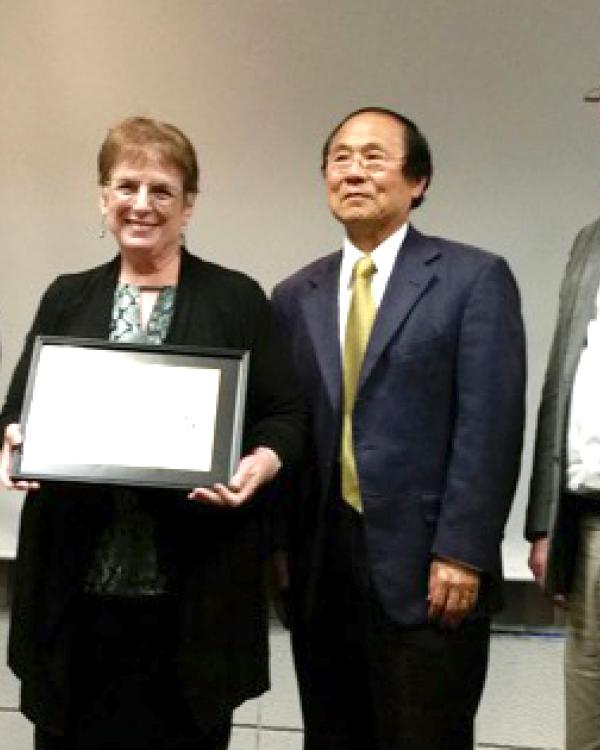
Chair of the Academic Senate Kum-Kum Bhavnani, Judith Green, Chancellor Henry T. Yang, and Keith Clarke, a previous Outstanding Graduate Mentor Award winner, at the Faculty Legislature Award ceremony (Photo credit: Patricia Marroquin)
Judith Green, Professor in the Department of Education at UC Santa Barbara’s Gevirtz School, has received a 2015-16 Outstanding Graduate Mentor Award. UC Santa Barbara’s Academic Senate honored her achievement at the Faculty Legislature meeting on April 21, 2016. In her 25-year career at UCSB, Green has mentored 54 doctoral and master’s students.
When students are asked to describe Professor Green, her life-changing influence is a recurring theme. One student states, “Our work together has not only greatly enriched my knowledge in the field of education, but has also reshaped my life course and views of the world.” Another student, a Ph.D. candidate, shares, “When I was debating whether to continue or quit graduate school…[i]t was Dr. Green…who had a tremendous impact on my decision to continue pursuing a Ph.D.…She considers her time with students and mentees not as a burden, but as a time to develop ideas and learn together.”
Colleagues complimented that Professor Green “has been a model of a mentor that stops at nothing to support her students,” and “commits wholeheartedly and in great depth, intellectually and socially, to our graduate students—at the recruitment stage, during their graduate career and throughout their professional careers—because she cares deeply.”
“The mentoring of the dedicated scholars with whom I have had the privilege of working, along with the doctoral students with whom I have worked, has continued to demystify what is involved in being a socially committed academic, and a mentor to new generations of graduate students,” Green explains in an essay, “Mentoring As A Way Of Life: A Reflexive Account.” “Mentoring for these groups of academics is an intergenerational relational process that does not end at the conclusion of a class period, course or program. Viewed in this way, my personal philosophy of mentoring continues to grow through these interpersonal relationships and lived experiences in which I am privileged to work with committed scholars. Mentoring is dynamic part of life in higher education, not something that one does only in small moments with particular individuals. Over the past 25 years at UCSB, I have developed with doctoral students, and faculty colleagues, intergenerational communities of scholarly work, that constitute intellectual ecologies, i.e., communities that make visible possibilities for both professional and personal directions that support empirical and socially committed ethnographic research in complex educational contexts. This process has enabled me to continue to learn with, and from, those who contribute to these developing intellectual and intergenerational ecologies. Mentoring for me, therefore, is a generative process for all who elect to participate in our growing, and ever evolving, intergenerational global community.”
Judith Green, a professor in the Department of Education at the Gevirtz School, has been teaching for more than five decades across levels of schooling (K-20). She received her M.A. in Educational Psychology from California State University, Northridge and her Ph.D. from the University of California, Berkeley, where she explored the relationships between teaching and learning, literacy and knowledge construction. Green’s recent research focuses on how classroom practices support access to students across academic disciplines in classrooms and in virtual communities. Green is a fellow of the American Educational Research Association and the inaugural winner of the John. J. Gumperz Memorial Award for Lifetime Scholarship by the Language and Social Processes Special Interest Group (LSP SIG) of the American Educational Research Association (AERA).